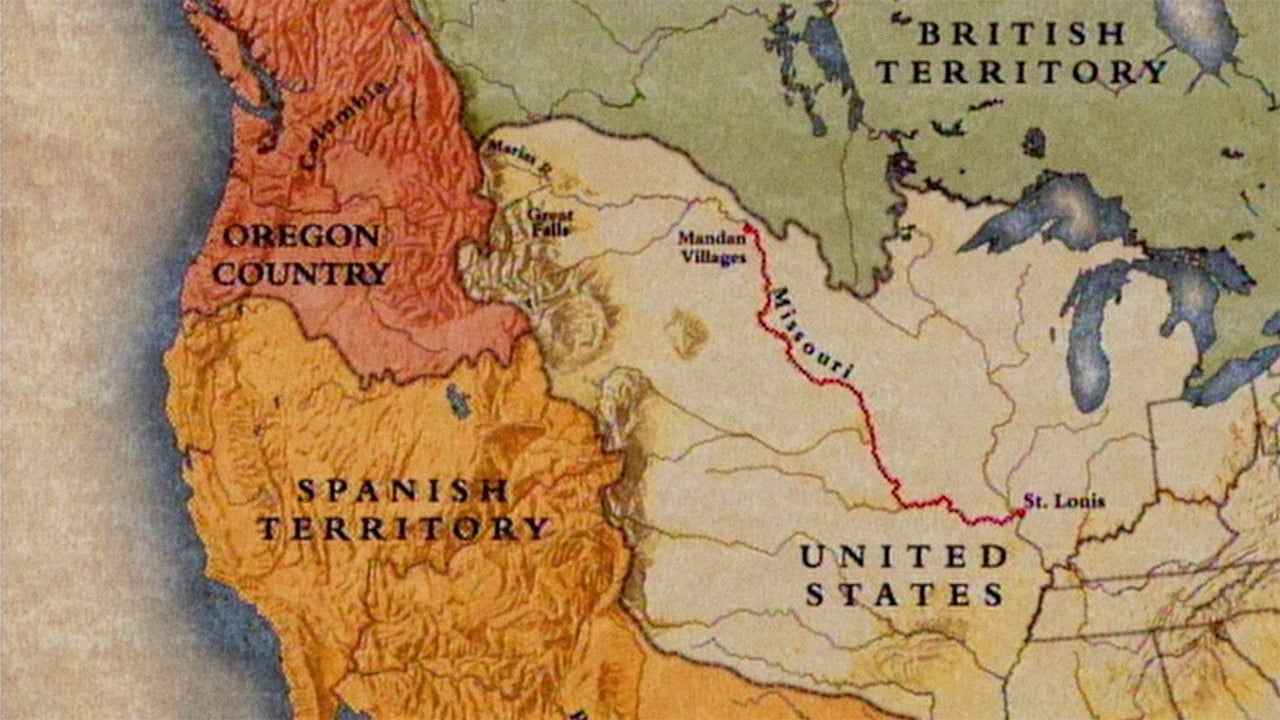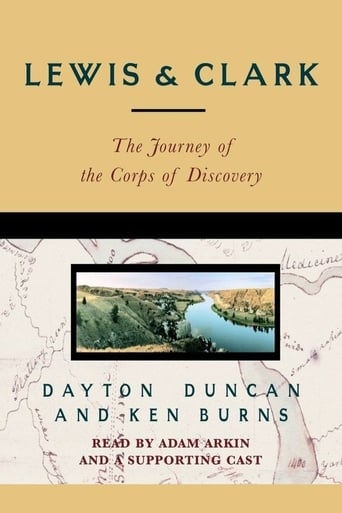

I be an old fart of 60 years. I enjoy Walking Dead and GoT so I believe I have a pretty well rounded circle of influence.That stated this film blows me away (far, far away). As I sit in my 3 BR 3 B AC'd and heated house, with a full fridge of nourishment, I finish watching this film desperately wishing I could have been one of the Corp. A deep melancholy settles into me. The only cure I have found for this morbid depression is to get my rig ready, and shoot up my medicine by hitting replay. Again, and again, and again,...... I fear for my sanity. I have tried exploring the wilderness around me, but I can only hike a few yards without meeting some other human or their waste. Alas.
... View MoreI'm writing this when there are only seven other reviews. Compared with the hundreds or thousands of reviews of popular cinematographic dross (the greater the dross, the more the reviews), is there any point?The Journey of the Corps of Discovery is an amazing story, beautifully told. President Jefferson sends his secretary to find a route to the Pacific Ocean across thousands of miles of largely unknown territory. The adventure proves that truth can be stranger than fiction. This is an epic trip. Ken Burns has made some marvelous series, but none better.There are so many memorable moments that it seems pointless to select a sample. I'll never forget Meriwether Lewis's diary entry on his 31st birthday, rueing his indolence and lack of achievement at what he thought would be the half-way stage of his life.Everyone should see this wonderful series. Unfortunately, the bulk of the popcorn-eating, couch-potato viewing public prefer banality and fantasy to fact. Treat yourself to one of the best series ever.
... View MoreKen Burns' film is a landmark study of the 1804 through 1806 Lewis and Clark expedition, starting in St Louis, and returning there two years later, having found a route to the Pacific Ocean. Put your political leanings aside, this film does not judge whether the USA, Spain, and France *should* have been able to grab and trade the native lands occupied for centuries by various Native American tribes. Lewis and Clark, and the men that went with them, were true explorers. Their journey is almost unimaginable. When you fly west over the USA during a clear day, and can see the wide expanse of mountains, you can begin to understand what an ordeal it was for them to cross over to what we now call the Columbia River. This is not a dry historical film. Everyone should see it, for the historical significance of the journey. The city of St Louis built a high arch in commemoration of the journey, and it is called "The Jefferson Expansion Memorial."I saw the DVD, and it is a really fine one. I got it as a free loan from my local library, maybe you can too!!
... View MoreIf you have a love of history and the wilderness, and adhere to a certain code, the Lewis and Clark saga can get way under your skin. It certainly got under mine. In fact, it's still there although it doesn't itch quite as much as it once did. If you doubt me, watch writer/commenter Dayton Duncan fight back tears as he recounts Meriwether Lewis' heartbreaking demise in Ken Burns' PBS special on Lewis and Clark. The journey of the Corps of Discovery, as the expedition was entitled, occupies the emotional center of the history of the West in the same way that the Civil War occupies the specific history of the South. More than a few people now living would be tempted to sell their souls for the chance to jump back to 1804 and push off up the Missouri River with the Corps. Only the infected will understand.Actually, I have Dayton Duncan to blame for my infection. I picked up his book, `Out West', a chronicle of his attempt to retrace some of the Lewis and Clark Trail (in a VW bus) at a yard sale and acquired the bug. From then on, any Lewis and Clark site had to be seriously out of the way from me to not attempt a visit. When I stood at Lewis' grave in rural Tennessee, reputedly on the spot where he died, I can't lie. I was moved. (I still want to see the site of the Two Medicine Fight, in which Lewis and his detachment, which had split off from the main party on the return journey, had been forced to kill two Blackfoot warriors; the only two Native Americans to die at the expedition's hands. It was an act for which the stratospherically-principled Lewis paid in kind (he was accidentally shot and severly wounded by one of his own men while hunting not long after the fight (unmentioned in the series); a pity as this sub-expedition was largely unnecessary.)Despite its suave production, enchanting music track and heartfelt commentary by various historians including the late Stephen Ambrose, Ken Burns' rendering of the Lewis and Clark tale is just adequate historically. This is not to say I didn't like it. I thoroughly enjoyed it, both my initial viewing and a recent repeat broadcast. But there is so much more meat on the bones of this great adventure than the series was able to bite off. Anyone coming away from it with a case of the bug should definitely learn more. Allow me to suggest a course of action.Much information resides on the Web but will often not tell you much more than the PBS production. Still, these sites can be fun. But don't be afraid to go analog as well. Find a good book or two on the subject.They're out there and will serve up more details. My favorite (out of print but still findable in a good bookstore or library) is `Lewis and Clark: Partners in Discovery' by John Bakeless. Here, you'll acquire a detailed, sensitive account of not only the expedition itself, but of the childhood and coming of age of Lewis and Clark, their experience as army officers on the frontier (then in Ohio) that laid their foundation as incomparable woodsmen, how the expedition was planned and outfitted, and what became of the many of its members after the return. Bakeless also makes a haunting and persuasive case for the possibility that Lewis did not commit suicide but may have been murdered; something I have always thought possible, certainly along the Natchez Trace, which in 1809 was probably the most dangerous place in North America. (This excellent book really should be re-printed for the bicentennial.)Another interesting book (also out of print) is `Two Captains West' by Albert and Jane Salisbury. Not as scholarly as the Bakeless, it's still a worthy read and filled with photos of many actual Lewis and Clark sites, including some that are less well-known and, thereby, even more interesting to buffs. Once you've acquired a workable overview of the expedition, take the plunge into the actual journals that were compiled along the way by the Captains. At least two editions are extant, the most accessible being the abridged version by Bernard DeVoto, based on the original, complete journals (seven volumes and maps) published by Reuben Gold Thwaites in the early 1900's. At first, you may find the language challenging but eventually it will charm you. Then, go back to the PBS production for dessert. However, if you have not visited at least a couple of sites, I'm not sure we can call you a true buff. But once you're through DeVoto, your application for membership will be considered. And don't forget the aforementioned Dayton Duncan book.You'll like it.A few months back, some soulless MBA-type did an article for the equally soulless e-zine, Slate, in which he disclaimed the importance of Lewis and Clark because they failed to find the Northwest Passage. This is rubbish, of course. The Passage was never there. How could the expedition have failed by not finding it? The importance of the Corps of Discovery lies not what it did, (which is still remarkable, Lexus Boy), but in what it symbolizes, what it says about the enormous promise that America once embodied, and the tough, resourceful people we once were. It speaks to a time when it was still not too late to rationally and humanely inhabit a world of profound beauty and natural harmony; a world in which the civil and hospitable Mandans, the incredibly noble Nez Perce, and even those pesky Teton Sioux and Blackfeet, all with knowledge to impart, had a place. We have actually fallen far, only to make temporary soft landings in our Lincoln Navigators. Lewis and Clark were geniuses, not of academia but in how they, and their command, manifested intelligence, compassion, and courage, often in the face of hardship we can barely imagine.
... View More